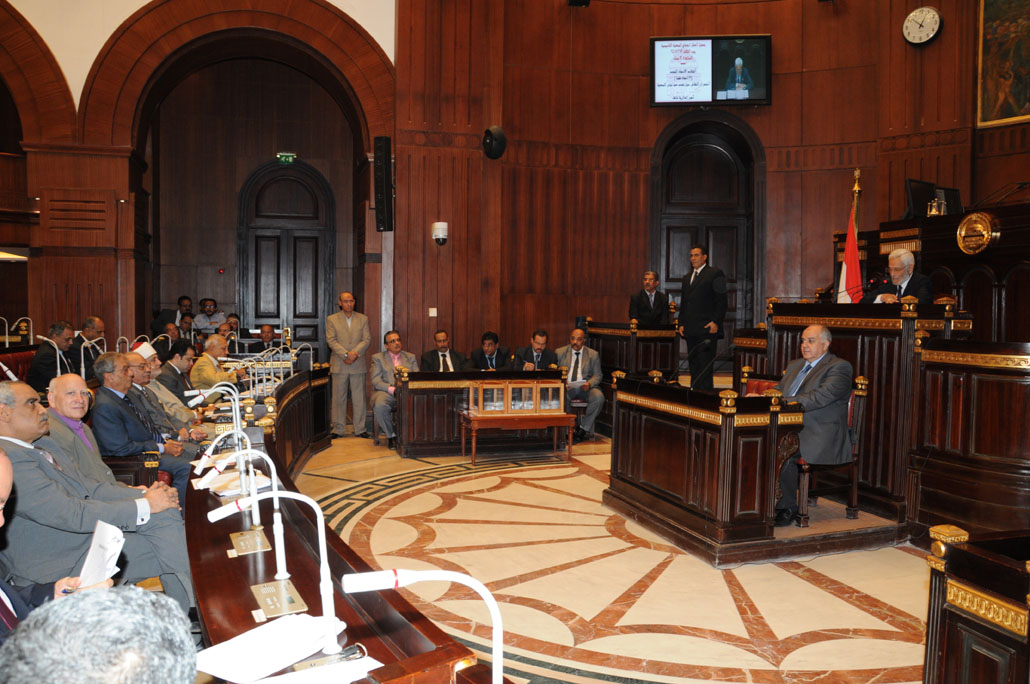CAIRO: Since the week was void of any news guaranteed to make the front pages of local newspapers, editorials focused on the various aspects of corruption, the ongoing struggle of journalists against imprisonment for publishing crimes, and further analyzed the connotations of President Hosni Mubarak s interview with Al-Arabia TV earlier this week.
While the presidential spokesperson has been continuously reminding governments not to take offense at Mubarak s regional comments; Iraq has pulled out of the latest Arab League meeting in objection to the president s comments about civil war and Iran s control of the Iraqi Shiite; Egyptian writers are now focused on the local announcements.
The interview has nothing new, wrote Magdy Mehanna in Al-Masry Al-Youm on Tuesday. It only contributed to the frustration, Mehanna noted.
He explained that frustration arose over the president s announcement that enactment of the new terrorism law, slated to replace the emergency laws, will take a year and a half. Frustration also arose, the writer continued, over the president s statement that article 76 grants anyone the right to run for president, which Mehanna affirms is not the case.
In the same newspaper, Soliman Gouda dedicated his weekly column to analyzing the president s interview. He called for councilors to revise the president s speeches and interviews, since his image reflects on the country. He also said that if some of the president s phrases had been reworded they wouldn t have had the same controversial effect.
But Gouda was also critical of the local content of the interview. When the hostess asks the president if he was comfortable with the state of the Egyptian street and he says ‘he is very comfortable,’ then there must be something wrong, wrote Gouda.
The nicest way to describe the current street, Gouda continues, is extremely worrying.
Osama Heikal shared the same opinion in Al-Wafd. Referring to the same presidential comment on the current state of the country, Heikal said that the interview left us more worried about our future.
In Al-Akhbar, the tone was different, mainly defending the president s statements. Those who ignore the facts was the title of Galal Dowidar s article in the national newspaper.
The concern the president expressed over Iraq s future is the same concern that we feel and dread with the continuity of the horrible civil war in Iraq, wrote Dowidar, adding that many didn t like the facts that the president had brought up.
Coinciding with the conflicting criticism and praise the interview received, many writers were concerned with the various aspects of corruption, whether economically or administrative.
Al-Masry s editor, Magdy El Gallad, addressed the literal marriage of power and money. Noting the recent wedding of Minister of Trade and Industry Rachid Mohamed Rachid s daughter to businessman Akef El Maghraby s son, El Gallad said that no official is capable of separating between relatives of blood and marriage and his authority.
We all refuse to be ruled by one group, whatever it is, much less one family, El Gallad added.
In Al-Akhbar, Ahmed Ragab expressed concern over Egyptian dependence on American wheat while local farmers can’t find buyers for their wheat.
Other writers, in independent and national newspapers alike, were more concerned with the fate of those responsible for the sunken ferry. As conflicting investigative reports surface (each concentrating blaming on one party and ignoring the others), more have expressed concerns over ferry owner Mamdouh Ismail s stay outside the country.
On the other hand, the official editorials of national newspapers made an effort to polish the government s image, noting its promising announcements. On Tuesday, Al Ahram s editorial defended the much criticized privatization policy while calling for more transparency and more attention to workers rights.
The next day, Al Akhbar s editorial revised the government s policies, commending its adherence to the program the president had set during the last elections. The editorial surveyed a number of cabinet-issued decisions that would improve employment rates, wages and the industrial sector.
Meanwhile, many journalists expressed concern over the fate of a once-promised legal modification that would abolish imprisonment as punishment in legal publishing disputes.
Al-Masry Al-Youm featured a number of varied views. El Shalakany provided a legal analysis of the prospective law s main issues. He explained the difference between libel and slander, noting how other countries use the concept of absence of malice and stressed that Egypt had signed an international anti-corruption treaty to give journalists the liberty to call attention to corrupt officials or citizens.
In the same newspaper, Amr Khafagy was critical of journalists for committing violations of their professional code of ethics. He said personal interests often take the space that is supposedly dedicated to serving readers and citizens. He also noted that a state of violence has dominated writings, reflecting a state of societal and political violence.
Khafagy said all newspapers, whether state-run, independent or affiliated with political parties, violate the journalistic code of ethics.
The latter type was the focus of Salama Ahmed Salama s article in Al Ahram. Ironically, in a state-run newspaper known for its strong ties with the government and ruling party, Salama said there is no future for newspapers that are run according to party policies.
While Salama was referring only to newspapers affiliated with opposition political parties, he said there is only room for independent journalism.
The development and advancement of political life and as political parties regain their status they won t need party newspapers, wrote Salama. This will reflect on the development of journalism, making it an actual fourth authority free from the control of the government and any political party.
